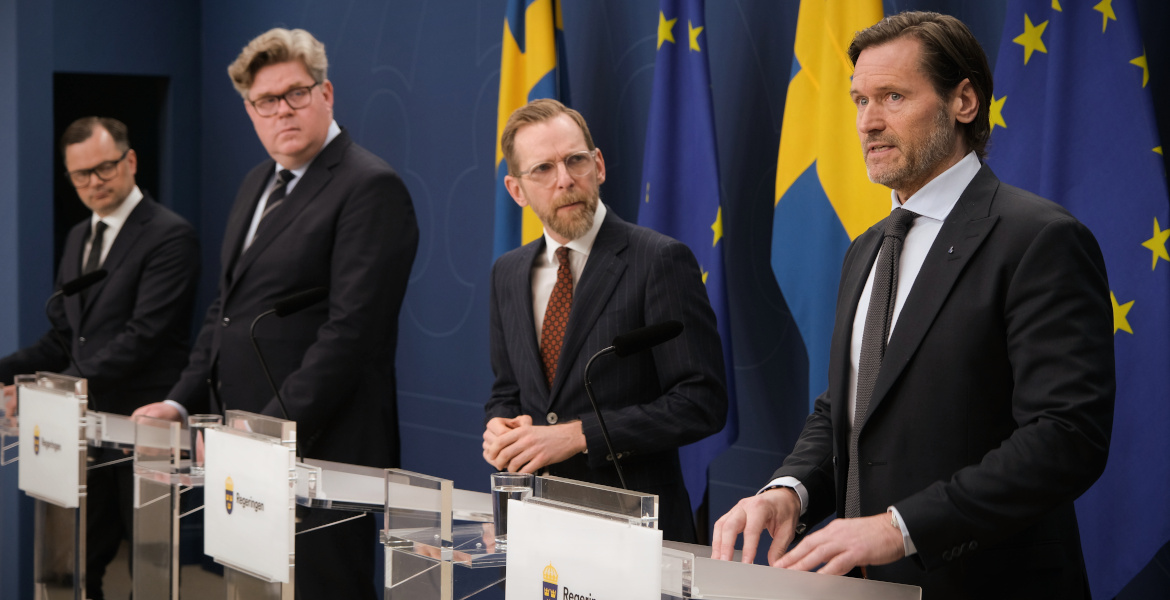One of the topics discussed in the last week’s episode of Medierna i P1 was the European Commission’s controversial mass surveillance proposal Chat Control 2.0 and its consequences for journalists. The episode featured EU Commissioner Ylva Johansson, IT and media lawyer Daniel Westman and Anne Lagercrantz, President of the Swedish Publishers Association.
Westman and Lagercrantz were critical of the mass surveillance proposal, partly because of the consequences for the protection of sources. The Swedish Association of Journalists and the Swedish Newspaper Publishers have previously warned about the consequences of the proposal for the same reasons.
Comically, the pre-recorded interview began with Johansson asking if she could call Martina Pierrou, the interviewing journalist, via Signal or Whatsapp instead.
At the time of the interview, Johansson and Pierrou were able to talk via Signal, but if the mass surveillance proposal goes through, that possibility will disappear. In a response to me on X (Twitter), Signal’s CEO announced that they will leave the EU if they are forced to build backdoors into their app.
This is a very wise decision on Signal’s part as such backdoors undermine the safety and security of children and adults around the world. The rest of the world should not have to suffer because we in Europe are unable to stop EU proposals that violate human rights, the Convention on the Rights of the Child and our own EU Charter.
Below is an analysis of all the statements made by Johansson in the interview. The quotes are printed in full. The time codes link directly to the paragraphs in the section where the claims were made.
Incorrect suggestion of a requirement for a court decision
When asked about what the bill means in practice (18:55), Johansson repeated her recurring lie that a court order would be required to scan communications. She explained the practical implications of the proposal with the following sentence.
“To force the companies to make risk assessments, to take measures to ensure that their services are not used for this terrible crime and ultimately to make it possible, by court order, to also allow the scanning of communications to find these abuses.” – Ylva Johansson (2023-09-23)
Pierrou followed up with a remark that the proposal may require scanning without suspicion of crime against any individual (19.24). Ylva Johansson responded as follows.
“No, scanning will take place when there is a risk that a certain service is being used extensively to spread these criminal offenses. Then a court can decide that scanning is permitted and necessary.” – Ylva Johansson (2023-09-23)
The suggestion that a court decision would be required is incorrect. Johansson made the same claim in the debate against me in Svenska Dagbladet from April this year (the only debate in the Swedish media that Johansson has participated in). I then offered to correct her claim myself, in order to investigate whether she knew that her proposal did not require a court decision. The proposal also accepts decisions from administrative authorities. Johansson knew this. Nevertheless, she repeated the lie in the interview in SVT Aktuellt (April 2023), Ekot’s Saturday interview (June 2023) and now today in Medierna i P1.
Omitted consequence
In the answer to the same question, Johansson omitted the most crucial point, namely that backdoors are a prerequisite for the scanning of end-to-end encrypted conversations to be done at all. Once these backdoors are in place, they can be abused and cause data leaks. Other states, such as the US where most of the affected services are based, can use the backdoors to scan for content they are interested in.
The proposal states that service providers may only use their position to scan for child abuse material and grooming attempts. Even if we ignore the likely purpose creep, it doesn’t matter. Today, we have technical protections that ensure that our end-to-end encrypted conversations are impossible to intercept. The European Commission wants to replace these technical protections with legal restrictions on what the new backdoors can (and cannot) be used for.
This naivety is unprecedented. It is incomprehensible to me how the EU can believe that the US would allow American companies to install back doors that are limited to the EU’s prescribed use. As a thought experiment, we can consider how the EU would react if the US tried to do the same to our companies.
If we take into account the highly likely purpose creep, the situation gets even worse. We only have to go back to 2008 to demonstrate this. At that time, the FRA debate was in full swing and FRA Director General Ingvar Åkesson wrote a debate article in Svenska Dagbladet with the following memorable words.
“FRA cannot spy on domestic phenomena. /…/ Yet the idea is being cultivated that FRA should listen to all Swedes’ phone calls, read their e-mails and text messages. A disgusting idea. How can so many people believe that a democratically elected parliament would wish its people so ill?” – Ingvar Åkesson (2008-06-29)
15 years later, Åkesson can hopefully understand why we thought that a democratically elected parliament could want its people so badly. Right now exactly this “disgusting idea” (the Director General’s choice of words) is being proposed.
Belief in the existence of non-existent technologies
Pierrou then asked how the solution would actually work. Pierrou pointed out that “according to an opinion from the European Data Protection Board, the technology required by the proposal does not exist today” (19.55).
Johansson responded with a quote that will go down in history.
“I believe that there is. But my bill is technology-neutral and that means that we set standards for what the technology must be able to do and what high standards of integrity the technology must meet.” – Ylva Johansson (2023-09-23)
Here Johansson again shows that she based her proposal on incorrect assumptions about how technology works. After having been refuted by the world’s experts, she is now forced to switch to opinion arguments such as “I believe it exists”.
Whether technology exists (or can exist) is of course not a matter of opinion. It is, always has been, and always will be technically impossible to scan the content of properly end-to-end encrypted conversations.
To smooth over the embarrassment, Johansson pointed out that the bill is technology-neutral. This may sound good, but it says nothing in the context. Setting standards for what technology must do is only embarrassing when it is done without first examining what is practically possible.
If service providers of end-to-end encrypted services are to be able to scan the content of conversations, they must build in backdoors. The backdoors allow them to scan the content before it is encrypted and after it has been decrypted. Without backdoors, scanning is and remains technically impossible.
Opinion on mass surveillance in mass surveillance proposals
Pierrou concluded the interview by asking what Johansson thought about the image of the proposal being painted as a mass surveillance proposal (20.19). Johansson then answered the following.
“Yes, that is a completely wrong picture. It is not about anyone monitoring at all.” – Ylva Johansson (2023-09-23)
The definition of mass surveillance should be that the masses are monitored (as opposed to targeted surveillance against selected suspects). As highlighted by Pierrou in a previous question, the Chat Control 2.0 scan does not require any suspicion of crime against individuals. Service providers should monitor what the masses write and say on the platforms. Service providers will report suspicious conversations to the new EU centre to be set up in The Hague.
The proposal is thus, by definition, a mass surveillance proposal.
However, Johansson chose to ignore the fact that a mass surveillance proposal requires mass surveillance. Instead, she tried to dismiss the criticism with the following argument and a pat on her own shoulder (20.34).
“It is obvious that when you are a bit of a pioneer, as I am in this case, you have to expect that you will also be questioned.” – Ylva Johansson (2023-09-23)
Unfortunately, I must crush Commissioner Johansson’s self-image and state that she has never been questioned for being a pioneer. Johansson is not even a pioneer in the field, something she herself should know.
It has barely been 30 years since the Stasi was disbanded.
Karl Emil Nikka
This article is republished from nikkasystems.com under CC BY 4.0.
About the author
Karl Emil Nikka is the founder of Nikka Systems, Security Profile of the Year 2021, author and a IT security expert.









